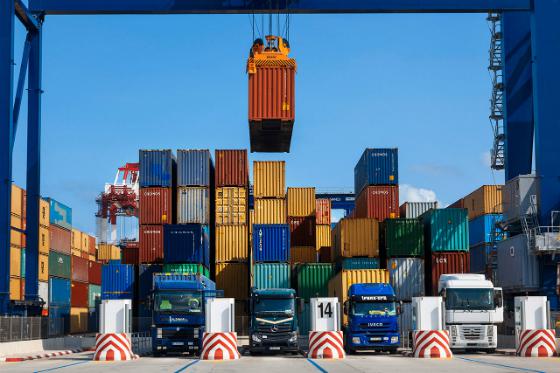China has traditionally been Iran's biggest trading partner. The Joint Comprehensive Plan of Action, the official name of the nuclear deal Iran signed with world powers, including China, in 2015, gave a further boost to bilateral economic relations.
Bilateral trade grew 31% during the first half of 2017 compared with last year's corresponding period to reach $18 billion, Iran-China Chamber of Commerce cited data from Chinese customs department.
According to the report, China's exports to Iran saw a 23% year-on-year increase during the period, rising from $7.2 billion to $8.8 billion.
Iran's exports to China rose from $6.5 billion to $9.2 billion, registering a year-on-year increase of 40%. Oil was the main commodity exported by the Islamic Republic to the Republic of China.
China is the top importer of Iranian oil and non-oil commodities.
Iran exported 14.8 million tons of non-oil commodities worth $3.61 billion to China during the six-month period, up by 4.2 million tons in volume and $970 million in value YOY.
Last fiscal year (March 2016-17), China imported 37.7 million tons of Iranian goods worth $8.17 billion, up 9.1% compared with the year before and exported $10.73 billion worth of commodities in return. Since Iran's overall non-oil foreign trade stood at $87 billion, trade with China accounted for more than one-fifth (21.72%) of Iran's total commercial exchanges with other countries last year.
Latest statistics on Iran's foreign trade provided by the Islamic Republic of Iran Customs Administration show Iran exported $2.84 billion worth of non-oil goods to China and its imports reached $3.49 billion during the four months of the current Iranian year (started March 21).
Major Investor
"Iran-China trade has been developing since JCPOA. China is not only Iran's biggest trade partner now but also one of the major investors in our country," Iran’s Ambassador to China Ali Asghar Khaji told IRNA, referring to China National Petroleum Corporation's 30% share in the $4.8b-contract involving Iran, France and China to develop Phase 11 of the giant South Pars Gas Field.
Last week, China signed a contract with Iran to finance the electrification of a 926-km railroad from Tehran to the northeastern city of Mashhad in Khorasan Razavi Province with a $1.5 billion loan. This was the first foreign financing in an Iranian project post JCPOA.
As per the agreement signed between the two sides in Tehran on Tuesday, the guarantee for the loan, which is to be granted by Exim Bank of China, will be provided by Iran’s Bank of Industry and Mine. The electrification project will be carried out by China National Machinery Import and Export Corporation, otherwise known as CMC. The project is expected to take four years to complete.
"China Exim Bank has financed 26 projects in Iran to date," Sun Ping, vice president of Exim Bank of China, was quoted as saying by IRNA on the sidelines of the signing ceremony for the financing deal in Tehran, adding that $8.5 billion worth of loans have so far been granted by the bank to fund Iranian projects.
Tehran-Mashhad railroad is a strand of the so-called New Silk Road–a 3,200-kilometer railroad project that ultimately sees Urumqi, the capital of China's western Xinjiang Province linked to the Iranian capital Tehran, connecting Kazakhstan, Kyrgyzstan, Uzbekistan and Turkmenistan along the way. The idea was first proposed by chief engineer of China Railway Corporation He Huawu in late 2015, just before international sanctions imposed on Iran over its nuclear program were lifted in January 2016.
From Tehran, the grand project will join Iran’s east-west network leading to Turkey and eastern Europe. It could also open a way to Europe via a developing rail route from southern Iranian ports to Azerbaijan and Europe.
The so-called Belt and Road initiative–a mega project that seeks to connect Asia, Europe, the Middle East and Africa–put forward in October 2013 by Chinese President Xi Jinping, includes several corridors through land and sea, including the New Silk Road rail route.
Beyond Trade
Khaji believes Iran-China ties are stronger than ever in all fields and the sides are in complete accord regarding bilateral, regional and international issues.
A Chinese delegation is scheduled to visit Iran to attend the inaugural ceremony of the second presidential term of Hassan Rouhani on August 5.
In May, IRNA reported that Iran’s trade with China registered a 70% growth under the government of President Hassan Rouhani, rising from $45 billion during the administration of former president, Mahmoud Ahmadinejad, to over $76 billion (from August 2013 when Rouhani took office to the time the report was published).
Aside from economic and political relations, Iran and China continually look for developing bilateral cultural ties as well. China has invited Iran as the guest of honor to the 24th Beijing International Book Fair scheduled for 23rd to 27th August.
According to Khaji, some 50 Iranian writers, publishers and artists are expected to attend the event.
Iran's Film Week will be held in late August at the China National Film Museum with the screening of Iranian films.
Financial Tribune
July 31






















































